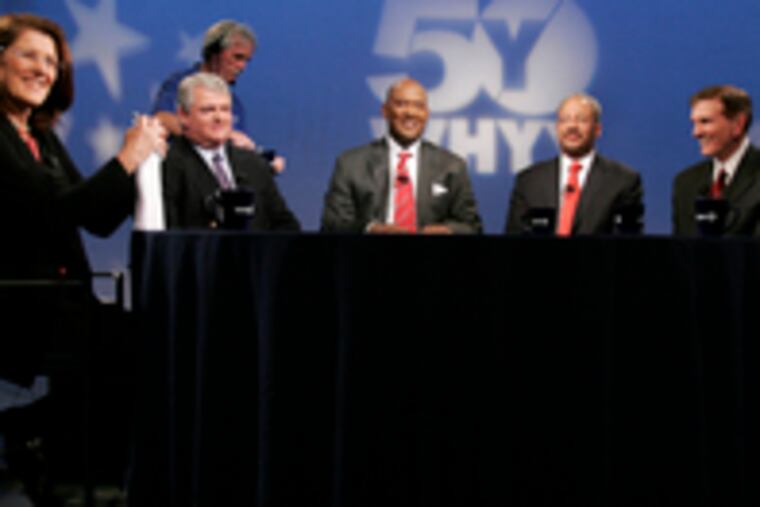Fifth debate a talk on the mild side
Perhaps it was a sort of calm before the storm. Or just a break in the action. Or the result of the civilizing effect of appearing on public television. Whatever the reason, the fifth and penultimate broadcast debate among the five major candidates in Philadelphia's Democratic mayoral primary was a relatively calm and restrained affair last night, covering little new ground.

Perhaps it was a sort of calm before the storm. Or just a break in the action. Or the result of the civilizing effect of appearing on public television.
Whatever the reason, the fifth and penultimate broadcast debate among the five major candidates in Philadelphia's Democratic mayoral primary was a relatively calm and restrained affair last night, covering little new ground.
One of the most heated conversations was spurred by a question about one piece of candidate Michael Nutter's plan to fight crime - his proposal to train police to stop, question and frisk individuals suspected of carrying illegal weapons.
All four of the other contenders vehemently agreed the former city councilman's idea was a bad one.
U.S. Rep. Chaka Fattah said the city "can't give license to police to stop anyone."
Fellow congressman Bob Brady said that the police did not want to do it and that he did not know how they could be trained to use such power properly.
State Rep. Dwight Evans called it "racial profiling."
Tom Knox described the approach as "tantamount to martial law" and said he worried it would give citizens reason to distrust the police.
Nutter said that his plan was "not about race, it's about criminals," that a similar tactic had helped reduce homicides by 75 percent in New York City, and that it could be implemented without violating anyone's civil rights.
"The first rights we have to be concerned about," he said, "are the rights of Philadelphians not to get shot."
With little more than a week remaining before the May 15 primary, and with one more debate set for tonight, the candidates kept largely to familiar themes, familiar (though toned-down) attacks, and familiar arguments.
Brady and Evans again questioned whether Knox, a millionaire businessman who served as a deputy mayor under Ed Rendell for 17 months, has the experience necessary to run the city of Philadelphia.
Brady said Knox's relative lack of a public record ought to disqualify him from consideration for the job, adding: "We make laws. He breaks laws."
A Maryland health-insurance company that Knox owned and ran from 1999 to 2004 was fined for hiring a convicted embezzler in violation of federal rules, and for issuing improper directives concerning how its clients should get emergency care.
"Bob Brady doesn't know me," countered Knox, the former CEO of U.S. Healthcare and several other companies. "He hasn't got a clue, and he's never run anything."
Evans then cited Knox's oft-used line about experience mattering less than results. The one who can claim the most results, Evans said, is Dwight Evans - on economic development, public education and policing.
Replied Knox: "My results are proven . . . and I've got the bankroll to prove it."
The debate also featured a modest reprise of the heated exchanges between Fattah and Nutter that dominated the previous debate Friday night.
This time, the subject was the proposal that is the centerpiece of Fattah's campaign, his idea of leasing the airport to a private business and using the proceeds to finance a new, child-focused anti-poverty offensive.
Fattah said he wanted to "start the long march to actually transforming this city" by attacking generational poverty and educational underachievement. He accused Nutter of having taken the position that a city can't do much of anything about these problems.
Nutter said that he believed the federal government had the major role to play on these issues but that there was much the city could do.
"The congressman has one idea [leasing the airport] to address a massive problem in this city," Nutter said.
"One is better than none," Fattah shot back.
"I have 15 ideas," Nutter replied, rattling off several of them, including programs to help the 80,000 Philadelphians with some college credit get their degrees.
Afterward, Fattah told reporters Nutter has "never offered one proposal or bill on poverty . . . he's never said he is interested in it."
Fattah also said the Board of City Trusts, on which Nutter sits, had been "cloaked away in secrecy" and should be made more open. The board dispenses millions of dollars in charitable giving each year, administering bequests left to the city.
Nutter replied that the board was "a wonderful organization" and noted that it had open meetings and was regularly audited.
The debate, held at the WHYY Technology Center and moderated by Marty Moss-Coane, was sponsored by WHYY, The Inquirer, and the Philadelphia Daily News. It was broadcast by TV12 and 91 FM.
Tonight, the Democrats meet for the last time. The event takes place at the National Constitution Center and will be televised on NBC10, starting at 7 p.m.
Tonight's Debate
At 7 p.m. on NBC10, Chris Matthews will host a debate among the five major Democratic mayoral candidates. The debate, at the National Constitution Center, is sponsored by the center, the Philadelphia Tribune, WHYY and NBC10.EndText
For the latest, most comprehensive coverage of the mayor's race, including candidate profiles, go to http://go.philly.com/mayorEndText